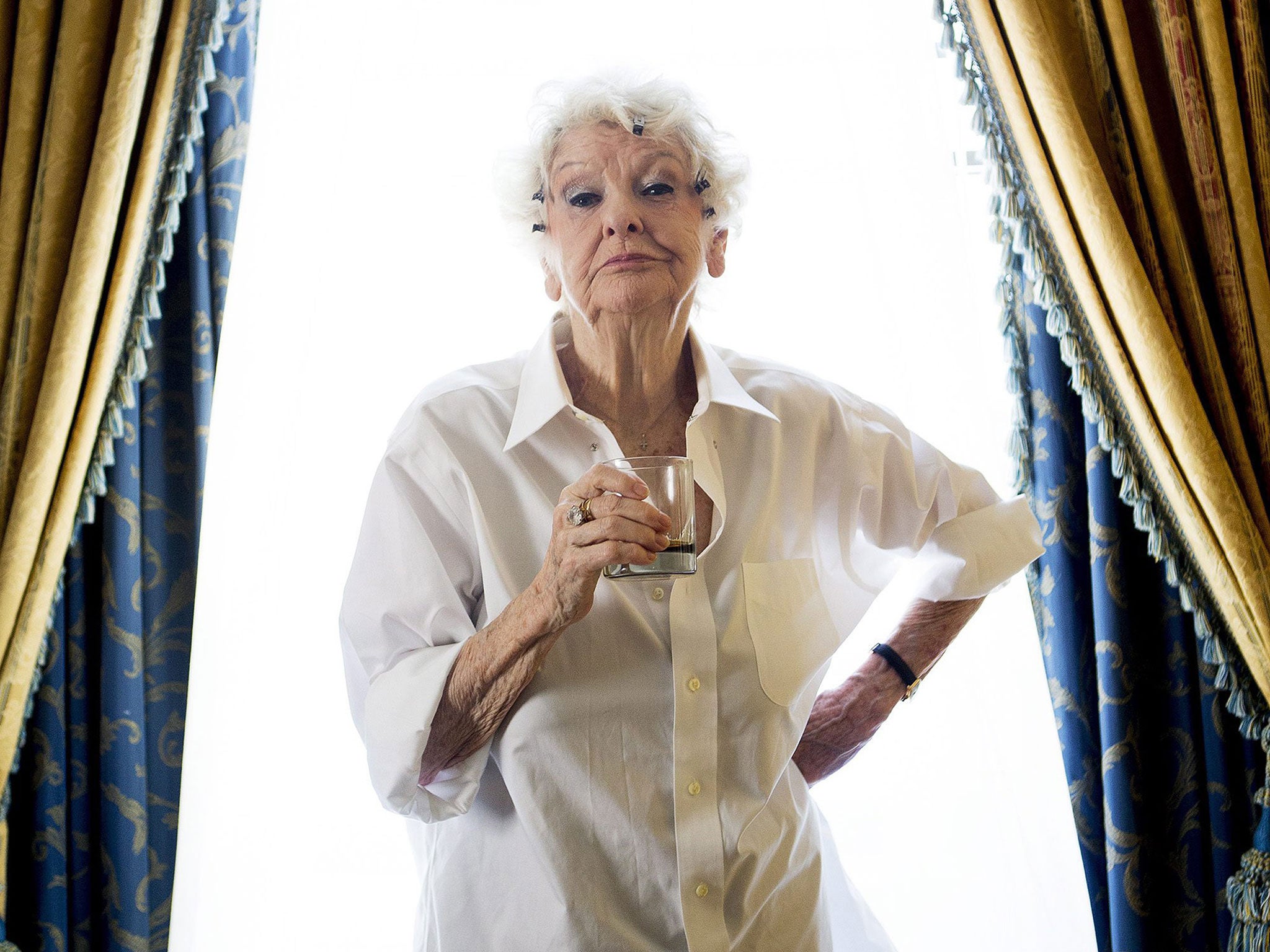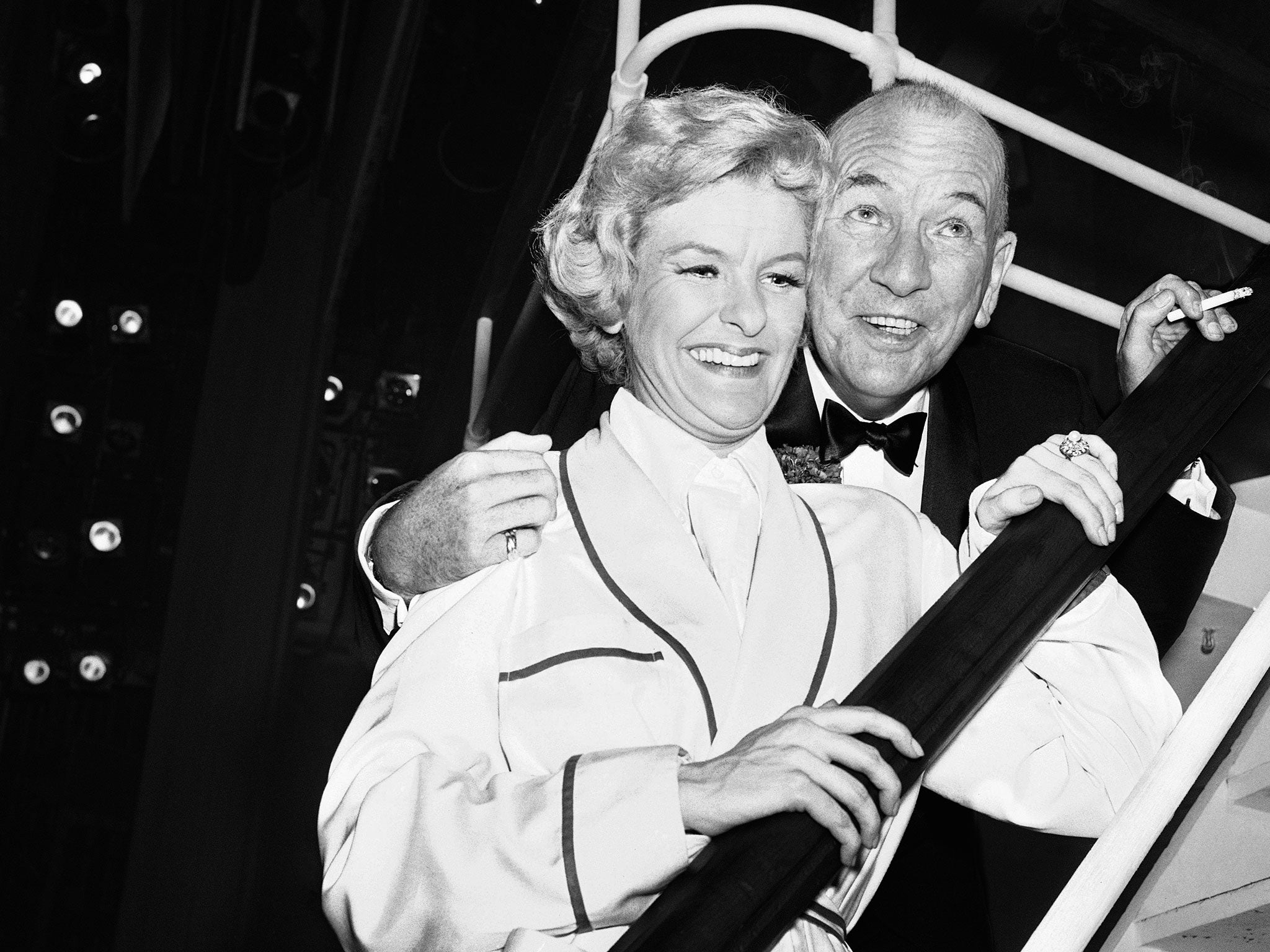Elaine Stritch: Hard-living actress and singer whose acerbic wit and husky voice helped her become a Broadway legend

Your support helps us to tell the story
From reproductive rights to climate change to Big Tech, The Independent is on the ground when the story is developing. Whether it's investigating the financials of Elon Musk's pro-Trump PAC or producing our latest documentary, 'The A Word', which shines a light on the American women fighting for reproductive rights, we know how important it is to parse out the facts from the messaging.
At such a critical moment in US history, we need reporters on the ground. Your donation allows us to keep sending journalists to speak to both sides of the story.
The Independent is trusted by Americans across the entire political spectrum. And unlike many other quality news outlets, we choose not to lock Americans out of our reporting and analysis with paywalls. We believe quality journalism should be available to everyone, paid for by those who can afford it.
Your support makes all the difference.Noted for her acerbic wit and gin-soaked huskiness, Elaine Stritch had become a theatrical legend by the time she retired last year. Particularly associated with the work of Stephen Sondheim, three of whose songs became anthems for her, she starred in stage musicals, notably Noel Coward’s Sail Away and Sondheim’s Company, and dramas including Edward Albee’s A Delicate Balance and, in London, Tennessee Williams’ Small Craft Warnings.
In the UK she had a television sitcom success starring with Donald Sinden in Two’s Company. In 2002 she had a personal triumph with her one-woman show, Elaine Stritch at Liberty (2002), which won her a Tony award and has been frequently cited as a masterclass in how to hold an audience enraptured for over two hours. The show was equally successful when it played at the Old Vic in London.
In Company she introduced a number specially written for her as the world-weary Joanne, “The Ladies Who Lunch”. Though she appeared in films and on television, the theatre was her greatest love, and this was reflected in her identification with a song from Sondheim’s Follies, “Broadway Baby”. As she grew older, she appropriated another Follies number, the anthem to longevity and survival, “I’m Still Here”. Her career lasted for nearly 70 years, and as recently as 2012 she was acting a recurring role on television as the domineering mother of a TV executive (Alec Baldwin) in 30 Rock.
Born in Detroit, Michigan, in 1925, she was a cousin of the late Samuel Cardinal Stritch, Archbishop of Chicago from 1940-58, and spent 12 years at the Sacré-Coeur convent before moving to New York in 1944 and studying acting at the Dramatic Workshop. “It’s quite an abrupt change from nuns to producers,’ she remarked, and she blamed her strict Catholic background for her rejection of the overtures of fellow student Marlon Brando.
She made her Broadway debut as a stockbroker’s daughter in the short-lived play Loco (1946), but scored a personal hit the following year in the revue Angel in the Wings, in which she performed a devastating parody of cabaret star Hildegarde and had a show-stopping number, “Civilisation”, detailing an African’s reaction to modern life (“They have things like the atom bomb, so I think I’ll stay where I om”) which was a hit for Danny Kaye and the Andrews Sisters –Stritch recorded it herself many years later.

She also had show-stopping moments in a revival of Pal Joey (1952), in which she parodied Gypsy Rose Lee in the number “Zip”, and a revival of On Your Toes (1954), in which she delivered a highly mannered version of “You Took Advantage of Me”. She had been understudying Ethel Merman in Call Me Madam when offered the role in Pal Joey, and since Merman had a reputation for never missing a performance, Stritch asked her if she could do both shows, providing she checked on Merman’s health first.
During Pal Joey’s New Haven try-out Stritch would check with Merman, then get a train to New Haven, and on matinee days it meant going frantically through the routine twice. Recounting the procedure in her one-woman show, Stritch added, “And then you wonder why I drank!’ Alcohol had buoyed her since her earliest days on stage, due to her lack of self-confidence, and she said, “I love to drink and it’s part of my life,” until diabetes prompted her to give up both smoking and drinking.
In 1955 she received her first Tony nomination for her tough-talking but lonely diner owner in William Inge’s Bus Stop, and in 1958 had her first starring role in a musical, Goldilocks. Set in the days of silent movies, the production was troubled – Barry Sullivan and Ben Gazzara both took on the male lead then left, Don Ameche assuming it for Broadway.
Though the music by Leroy Anderson, and lyrics by Joan Ford, Walter and Jean Kerr gave Stritch some pleasant numbers, notably a torch song, “I Never Know When (To Say When)”, which has become a cabaret favourite, Ameche’s numbers were weak and there was little harmony off-stage. Walter Winchell wrote, “Elaine Stritch and Don Ameche, who make all that love on stage, practically have to be introduced when the asbestos falls.”
Noel Coward told Stritch the show was not worthy of her, but said he would write a part for her in his next musical. In Sail Away (1961) he cast her as Mimi Paragon, an acerbic cruise guide who was not part of the romantic plot, but during try-outs it became apparent Stritch was the show’s driving force, so Coward eliminated the other leading lady and gave Stritch the central romance. It proved a triumph for the star, who had a climactic hit with “Why Do the Wrong People Travel?”, and she made her London debut in the show at the Savoy (1962).
She returned to Broadway to play in Who’s Afraid of Virginia Woolf?, later touring with the play. She also toured in The King and I and starred in a New York revival of Wonderful Town. In 1970 she played Joanne in Company, and her major solo, “The Ladies Who Lunch”, became such a staple of her appearances that applause greeted its spoken introduction, “I’d like to propose a toast.”
When she recreated the role in the West End she decided to settle in London, living in a suite at the Savoy Hotel and starring in the plays Small Craft Warnings (1973) and The Gingerbread Lady (1974). In 1972 she married Irish actor John Bay, having had relationships with actors Ben Gazzara and Gig Young, and restaurateur Joe Allen. In Elaine Stritch at Liberty, she relates that when she made the film A Farewell to Arms (1957) she fell in love with Rock Hudson, giving up Gazzara, adding, “And we all know what a bum decision that was!”
Other films in which she appeared include Michael Curtiz’ The Scarlet Hour (1956), Blake Edwards’ The Perfect Furlough (1958), a sprightly comedy with Tony Curtis and Janet Leigh, and the sleazy cult favourite Who Killed Teddy Bear? (1965), starring Sal Mineo, in which she played the lesbian owner of a discotheque harbouring feelings for dancer Juliet Prowse. Refused a certificate by British censors, the film has not been shown in the UK.
She also featured in two Woody Allen films, September (1987), as Mia Farrow’s mother, and Small Time Crooks (2000). Cocoon: The Return (1988) and Monster in Law (2005) were other films. In the early 1960s Stritch made sterling contributions to the cycle of albums produced by Ben Bagley concentrating on little remembered songs by great composers. Cole Porter’s “When Love Beckoned” and Rodgers and Hart’s wistful “A Little Souvenir” were two of the neglected numbers beautifully realised by Stritch, and Bagley also persuaded her to at last record “Civilisation”.
While in London she starred in the fondly remembered series “Two’s Company” in which, as a tartly sarcastic American thriller writer working at an English estate, she traded barbs with an urbane butler (Donald Sinden). Nobody’s Perfect, which co-starred Richard Griffiths and was based on the US sitcom Maude, allowed her to display her musical talents, as in an episode in which Stritch and Paddy O’Neill performed the duet from Mame, “Bosom Buddies”, taken at a much faster tempo than the original. Stritch and Bay returned to the US in 1981 (“Now that an actor is president it was time for me to come home.” The following year Bay died of a brain tumour.
In 1994 Harold Prince cast Stritch in his revival of Show Boat. The role of Parthy was not rewarding, but Stritch had a triumph two years later with her Tony nominated performance as the heavy-drinking Claire in a revival of Albee’s A Delicate Balance. Variety called her performance “marvellous”. Her one-woman show, Elaine Stritch at Liberty, which she wrote with John Lahr, won her the Tony in 2001. Her final Broadway performance was a return to Sondheim, taking over from Angela Lansbury as Madame Armfeldt, musing over long-ago relationships in A Little Night Music.
Until recently a resident of New York’s Carlyle Hotel, she performed in cabaret there several times, and in April 2013 gave her last show, Elaine Stritch at the Carlyle: Movin’ Over and Out. This year, a documentary, Elaine Stritch: Shoot Me, was released on DVD. “I’ve had a few very happy experiences in the theatre,’ she once said, “and a few monumentally sad ones. But I’ve survived. I mean, I’m sitting up and taking nourishment.”
Elaine Stritch, actress and singer: born Detroit, Michigan 2 February 1925; married 1973 John Bay (died 1982); died Birmingham, Michigan 17 July 2014.
Join our commenting forum
Join thought-provoking conversations, follow other Independent readers and see their replies
Comments